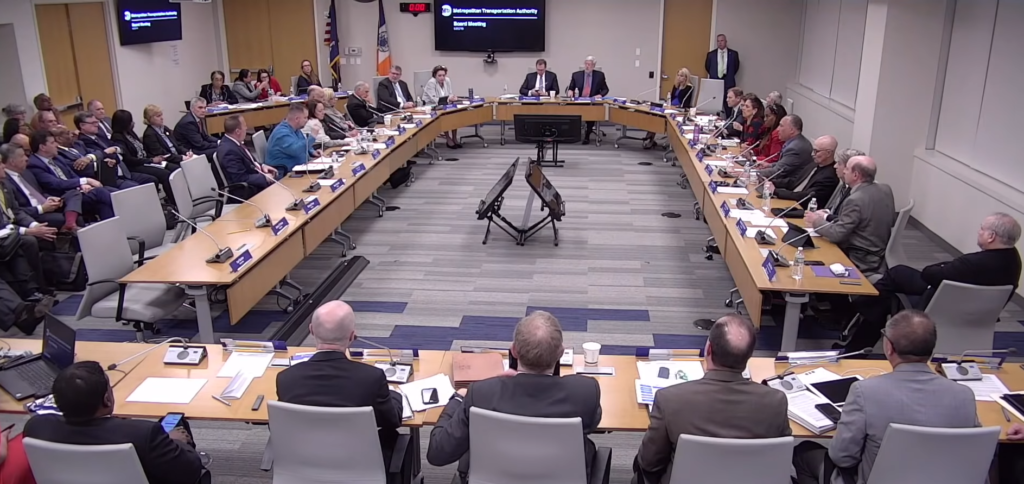We read with great interest and concern that the MTA signed off on new emergency contractor debarment rules during the Board’s Executive Session on Wednesday, May 22nd (Politico, May 23, 2019: MTA quietly institutes new rules requiring it to debar certain contractors). We are particularly troubled that this emergency action was taken during the Executive Session: nothing we have seen regarding the debarment order meets an enumerated purpose of the Open Meetings Law under §105. Conduct of executive sessions. The lack of public information about the emergency order and ways for the public to provide input is very concerning, particularly given your stated commitment to transparency and information sharing, to which we believe you are indeed resolute. However, signing off on this important regulation without public announcement or discussion could be construed as a message that significant Board business is being conducted behind closed doors and reinforce the public’s distrust of the agency – it’s credibility gap. PCAC’s Board representatives were, of course, privy to the announcement in the Executive Session, but had not seen the regulations prior to being called in and were under the impression that there would be a public statement and comment opportunity. This letter comes as neither of those has occurred.
To-date, the only information the public has received about the emergency rules was through the media report in Politico – late on the Thursday just before a three-day holiday weekend. According to the article, “…the rules are already in effect, and the public has 60 days to comment on them, during or after which the MTA may or may not amend them in response to those comments.” While we don’t know how or why this rule qualified as an emergency, we do know that the option of filing a Notice of Emergency Adoption and Proposed Rule Making would have triggered a notice in the State Register as part of the public process; however, we have not seen any such notice nor public process initiated for the rules, which we have heard are retroactive to April 12th.
Per the Department of State’s Division of Administrative Rules Rule Making in New York Manual, emergency rules cannot be withdrawn but must either expire or be superseded. Therefore, we request that either you allow this rule to expire without adoption or action, or adopt a new emergency rule put forth through a Notice of Emergency Adoption and Proposed Rule Making to supersede the current one and initiate the public proposal process. Ensuring that a public process is immediately put in place would detail the scope of the problem being addressed and provide riders and the business/contracting/consultant communities and others with the chance to weigh in and give input into what might well end up being a better proposed rule. In the interest of transparency, the proposed regulations should then be announced and discussed at the June Committee and Board meetings prior to a vote.
As the MTA’s legislatively-created rider advocacy organization, PCAC and its councils strongly agree that steps are needed to reign in construction costs, overruns and delays. Scarce public funds have for too long been spent on important projects that take years longer than they should, and we appreciate that the Governor and legislature included reforms – including the framework for debarment provisions (§ 1279-h) – in the FY2020 budget bill. However, the same legislation requires a thorough independent examination of MTA finances and operations, with an ultimate goal of agency reform and reorganization. Given that these issues are so closely tied and interwoven, it would seem to make sense to consider them together. While there may have been good reason for the debarment rules to be passed and issued last week, we don’t know what those reasons might be and have not even seen a copy of the signed emergency order. The public has a right to know what the new rules are and the effect they may have on ongoing and new construction, including projects such as East Side Access, Positive Train Control installation; Communications-Based Train Control installation, new rail and subway car purchases, Double Track, and Penn Access. First and foremost, the public has a right to know that an order leading to such a rules change even took place.
Contractors must be held accountable, but so too must the MTA for the decisions it makes: undertaking such a sea change in secret sends a message that the authority is in a constant state of emergency, is above the law, and can make or bend the rules as it sees fit. The public has a right to know what the MTA’s Board members are voting on, and how. They have a right to review documents in advance of public meetings, and comment on proposed rule changes. They should not have to read about votes taken in secret for “emergency orders” that will ultimately affect them for many years to come.
On behalf of the riding public, we would like an explanation of why the vote on the emergency order was taken during the Executive Session of the May 22nd Board meeting and why it was never disclosed. If there is an applicable qualification under the Open Meetings Law, please explain what it is and how it was determined. Let us know when and how the rule will be released publicly, and how comments may be submitted. If there is no legal basis for this extraordinary action, we request that the emergency regulation be superseded and that the proposed rule change be posted and a comment period opened, followed by a public vote be taken at an upcoming Board meeting after vetting by the appropriate Committee.
Read the full letter here:Debarment concern letter
